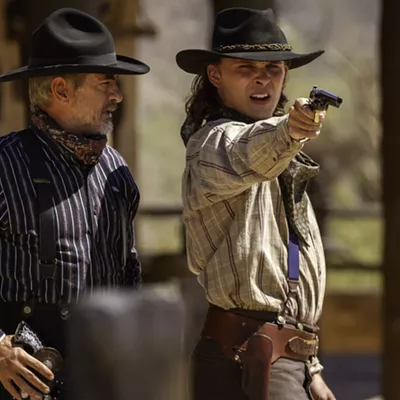It's been a long time coming. In the approximately 300 productions staged by Arizona Theatre Company over their several decades of existence, the group has never produced the classic and ever popular "Romeo and Juliet" by the old bard himself, William Shakespeare.
As of March 2015, consider it done.
And they've done an intriguing and appealing, although sometimes a bit overdone, rendering of it.
Director Kirsten Brandt has set the piece in Verona, Italy, which is where Shakespeare places it and where the story he—uh-hmm—"borrowed" takes place. Actually, the story in some form or another, had been around for years, and in Shakespeare's time stories set in Italy were quite popular. Brandt has placed the story in a time machine which lands in the 1960s. Now, directors have played around with Shakespeare for a long time, changing centuries or locales for any number of reasons: to refresh the story or to make it more accessible for modern audiences; to make the language more comprehensible or relevant; or perhaps to mine the story for new insights when seen within a different physical context. And, if a new slant supports the story and enriches it, lets us see it with new eyes which leads to a new appreciation of the piece, I'm all for it. But it's a tricky undertaking, and doesn't always compliment or expand the story's sense. In other words, it can be gimmicky.
Brandt's places the tale in the 1960s, a time of cultural revolution in the United States and in Europe as it was rebuilding after WW II and forging an identity less closely associated with the Roman Catholic Church. It seems legitimate enough, and the new context does allow for some touches many of us recognize (and are actually quite fun, like the bright orange Vespa that silently motors across the stage from time to time.)
But the story works here, as it would in many settings, because it is a universal one. Young love rashly crosses boundaries set by parents; the lovers challenge the feuds of families they had no part in creating; the blood-bought and blind loyalty to familial or political or sectarian alliances set us against each other and inevitably cause us great harm. It is always tragic, just as it is in the particular story of "Romeo and Juliet."
Overall, this is a fine production which allows the story to unfold in all its horrors: brutal murders taking the lives of members of both the Montague and Capulet clans; Romeo's avenging the death of his cousin and being banished just after he and Juliet have been married in secret; and the plot hatched by the Friar that goes horribly awry, resulting in the deaths of two teenagers who have vowed to look to the future, refusing to cling to the past.
The production has a strong visual sense, with the use of digital projections which denote the places of the action. Brandt is known for her use of this modern technology which allows for quickly changing locations without the need for shifting bulky scenery. And since this play takes place in a number of settings, the skillfully executed set by David Lee Cuthbert puts the use of the projections—which are most often abstract and evocative—to good use. However, sometimes the production feels visually cluttered, and thus distracting. Just because this really wonderful technology exists doesn't mean it has no need to be carefully edited. And when you add Vespas and musicians suddenly appearing from the wings from time to time, and sometimes outrageous costumes by Kish Fennegan, there's a sense of visual overload.
Brandt also does some gender-swapping in her casting. The character of the Prince, who is tried to the max by this Capulet/Montague feud, is played by a woman (Leslie Law), as is Benvolio (Kathryn Tkel.) It works just fine.
The cast is solid. In Chelsea Kurtz 's Juliet we recognize the petulant 14-year-old spoiled but sweet teenager. Paul David Story's Romeo is also the typical teen, hormones raging, falling in love with Juliet at their first meeting, and impulsively marrying the daughter of his family's enemy. Law also plays Nurse, who has been Juliet's nanny from birth, and she finds all the spunk and humor written into this wonderfully drawn character. Kevin Black as Capulet makes the character an intriguing man, and the scene where he gives Juliet the what-for when she refuses to wed the man he has chosen for her is just chilling. Richard Baird wonderfully inhabits Mercutio with all the smart-mouthed playfulness and very dark side that Shakespeare intended, and he also brings us a full-featured Friar.
Overall, this is an entertaining and cleverly re-imagined presentation of one of the most well-known plays in English literature. The tragedy resulting from defending our differences instead of honoring our shared humanity still plays out in the world everyday, justifying violence and killing love.
Click here for info about discounted tickets!






